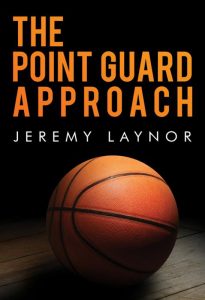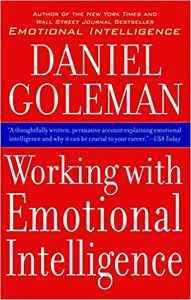
Leaders need to have a strong core, a foundation of leadership that brings out the best in them. In the book, The Point Guard Approach, author and Senior Vice President Of Global Sales at Providence Medical Technology, Jeremy Laynor, opens our eyes to the important parts of leadership and how these can be applied in your professional and personal life. In this special episode, Samuel Gbadebo and Jeremy discuss the leadership lessons learned from the court and how they apply to the realm of sales, and why developing these traits is a plus. Tune in and learn more about Jeremy’s approach to leadership.
—
Watch the episode here
Listen to the podcast here
The Point Guard Approach: Leadership Lessons From The Court To Business With Jeremy Laynor
We have with us a returning guest who goes by the name of Jeremy Laynor. Most of you might know Jeremy as the Senior Vice President of Global Sales for Providence Medical. What you don’t know is that he’s also an author. He wrote this book called The Point Guard Approach. You hear that and probably think to yourself, “The point guard approach? That’s a basketball reference.”
Another thing you might not know is that Jeremy was a point guard at Slippery Rock University. He wasn’t just any point guard. He was a star point guard. He has taken his experiences as a star point guard and tied them to his experiences as a global leader in the sales industry. What’s fascinating about this book is it is for anyone in business and sales. He highlights things like having a vision, resilience, and the fundamentals of the game.
He ties them to what that looks like through leadership, and not only what it looks like but how to do it with action steps in every single chapter. This book is fascinating. When I read it, it spoke to me. It speaks to someone in leadership, sales and business. It also speaks to people that are trying to get into something. For those of you that are trying to get into the industry, a book like this will speak volumes to you. It will help you communicate what you know you need to do to make something happen.
It’s invaluable to leaders that are trying to come up with different ways to execute successfully. I’m not going to spoil it by telling you any more. I’m going to let you read our interview. As always, thank you for reading. Make sure you check out this book by Jeremy Laynor called The Point Guard Approach. I hope you enjoy this interview.
—
Jeremy, how are you doing?
I’m doing great. It’s good to see you and it’s always good to chat.
It’s good to see you as well. It’s been a little while. How long has it been since the last time we spoke?
It’s under a year but maybe close.
When we spoke last, it was the heart of COVID. Access and some things were an issue but you’ve been doing and working on some things. I know your book has come out. First, catch us up on what’s happened since the last time we spoke, and then we’ll get into some more stuff.

The ups and downs of the pandemic, now that we’ve been in it for years, people are getting a little bit accustomed to having this shadow around. There’s been a lot of adjustments made in the business world, specifically in medical sales. I think there’s been some variation. At the end of the day, we’re still trying to serve the surgeon community and the patients, and drive great outcomes.
The core foundation is still there. How we deliver that value is changing. Not all at once but there’s definitely been an evolution. Things that you and I have talked about in the past offline like social media and other ways to interface with customers, drive value, deliver content, and grab interests are evolving for sure. It’s been interesting and not without challenges.
We’re definitely seeing ongoing challenges, especially in my space where you’re dealing with spine procedures and a lot of elective procedures. You don’t have room and beds are taken by COVID patients among other things. Labor strikes and all sorts of different dynamics have spawned off as well. It’s been interesting, to say the least, and it has been keeping us on our toes.
You talked a little bit about the unique ways you guys have tried to get access and keep things rolling. Tell us a little bit more about that. What does that look like? What’s been working and what’s not been working?
One of the areas we’ve been more successful in is territory sizing. It’s shrinking the scope of where our sales representatives go. Instead of driving multiple hours to try and find or see a surgeon, we’re trying to keep the territory geography a lot more concentrated because they get more reach and frequency where they have access.
We want to be able to see those physicians, interface with them and build a relationship in a condensed sales period, versus maybe more surgeons across the greater landscape but seeing them less often. Access is challenging, shrinking and focusing on reach and frequency, and driving value. We’re constantly trying to understand the needs of our customers, and then providing value where we can match that need.
Things have been happening there at Providence. Tell me a little bit about what’s been happening with you specifically. I know you got this book. We talked a little bit about it in our episode last time and it hadn’t come out yet. It’s out now so talk to us about it.
The Point Guard Approach is a culmination of probably five years of writing. Not because it’s a 50,000-word novel but because I was doing it in my spare time, which was far and few in between because I had a job, a family, and I travel. It was great. At the end of August, the publisher pushed it. Now it’s available on all your major outlets. Amazon is one that most people order from but also through my publisher, Olympia Publishers.
It’s been cool to reconnect with people from my past. They caught wind of the book launch and sharing from friends many years ago that maybe I haven’t stayed in close contact with. They are excited to see the book come out and read it. What’s rewarding is when you get feedback from somebody that just read the book, and it resonated. Something caught and moved them. I’ve had a few of those conversations and it’s been tremendously valuable to me.
[bctt tweet=”When you put yourself in a position to help others, it will always come around and help you.” via=”no”]
People that haven’t read it yet or don’t even know about it, we got to let them know who this book is for? We’ll start there.
It’s a wide range but The Point Guard Approach is a summary of principles that I collected over time. It’s geared towards the business person, leader or potentially salesperson. It’s not a sales book but because I’ve grown up in sales, it’s got a lot of sales content that will resonate. Anybody that’s looking to invest in themselves and wants to improve 1% or 2%, there are some great ideas and concepts that I learned on the basketball court.
I didn’t realize it until years later that I had brought these principles over to business. There’s this amazing parallel between what you do as a successful point guard on the basketball court and as a business professional. How can you apply these principles in your day-to-day operations? One of the core examples is the first chapter, The Principle’s Vision. I strongly believe that if you don’t have a vision of where you want to go, how are you going to get there if you don’t even know and you haven’t plotted, thought about or established your objective. What’s your goal? How do you create a vision for yourself and where do you want to be? That’s the starting point. That’s the foundation, and then you build from there.
We explore those types of things throughout the book. There are a couple of other principles like assists. Point guards have to be able to run the offense. It’s not their job necessarily to be the leading scorer but to set others up for success, set others up to hit an easy jump shot, or throw an alley-oop to a high flyer that can dunk it on the wing. That applies in business as well.
Not just as a leader in serving your team but your customers. If you’re a sales representative, what are you doing to set your customer up for success? How do you assist them beyond selling your product or service? It was Leonard Nimoy and I read his great quote, “The miracle is this, the more we share, the more we have.” It’s all about giving and assisting.
When you’re giving, you have a contextual thought process. You’re always trying to help somebody that given day, week, month. It’s going to come back to you because you’re probably making the right decisions. You’re putting yourself in a position to help others which in essence, will always come around and help you.
What are some of the more nuanced things in your book that maybe people don’t think of for whatever reason?
Flexibility is one of the principles that I talk about and explore. For me, flexibility has been one of those important principles. As I’ve navigated my career and life, things get thrown at you all the time. A pandemic is one. How do you navigate, stay flexible and pliable? No matter how much you plan and create this great vision, things are coming at you that are going to change your approach.
Are you flexible enough to make those adjustments, move forward and still be successful? It may be a different way to succeed or reach your objective. Can you do those things and make those decisions that allow you to do that? Some of that has to do with emotional intelligence which I’m a big believer in. If you haven’t read Daniel Goleman’s work like Working with Emotional Intelligence, I highly recommend it. It’s been a backbone for me. Self-awareness, self-regulation and empathy for others all contribute to flexibility. When I think about maybe nuance, that’s one that jumps off for me a little bit.

Is there a way that people can practice what you have in your book? Now that you have an audience now, and someone has read your book, and they want to put more things into practice, what would you advise?
Every chapter, I have a call to action workshop. In the end, there’s a summary of a couple of ideas and a lot of them are questions. It’s about challenging yourself to think a little bit differently. We were talking about assists, for example. It’s like, “Who have you helped this week, this month, this year? In your planning, what are you doing to create an environment where you’re going to help somebody else? Give me an example of that.” It’s to yourself. You’re holding yourself accountable.
It’s the same thing with finishing. Finishing is one of the principles in the book. Finishing in sales would commiserate with closing. As a salesperson, if you go through the sales process and you don’t ask for the business, in the end, you’re doing your customer and yourself a disservice. You got to finish and hit the shot when you’re wide open or else you’ve wasted all that energy. Get down the court and create that. It’s the same thing with a sale. You’ve got to close and ask for the business. You deserve it.
The call to action there is, who you have closed? What types of different closes have you used this month? Every chapter and every principle has correlating action items that are practical. Not all of them are magical or you haven’t thought of or heard of before, but this framework allows you to challenge yourself in some different ways that help you grow, evolve and move forward. That’s what it’s all about. That’s why I wrote the book because it was a challenge for me. I wanted to do something that I knew nothing about, which is writing.
I want to ask you on that note. A lot of times, people talk about, “This person was my inspiration for this book.” Was there someone in mind when you wrote this book? Was it more of, “I just want to get this out?”
I don’t know that it was one person in mind, but there are a lot of people that have contributed to the energy, and the output was this book. I had a lot of mentors, great coaches, and people in my life like family members and my wife. A lot of people have greatly influenced the book. It was interesting. The jumping-off point was a meeting I had with a surgeon in Houston. We’re having dinner. He told me that he was on LinkedIn doing these blogs.
It was a few years ago. He was blogging a lot about orthopedic spine surgery and all the things that go with it. Some publishers approached him and said, “If you can put your blogs together and do it in an organized fashion in 90 days, and it makes sense, we’ll publish and make it a book.” He did it. He wrote another one in 180 days. It’s something crazy. He told me about it.
I was like, “He’s a busy spine surgeon. If he can do this, I’ve got to give it a shot.” That was the jumping-off point, and then many other people had contributed along the way. For anybody interested in and taking on that type of challenge, make sure you correspond with people who have done it before. It can cut down the time that it takes to get organized and move forward.
Besides sharing with people like myself and telling everybody you know, how have you let the world know about this wonderful book that they should read?
[bctt tweet=”If you go through the sales process and don’t ask for the business, you’re doing your customer and yourself a disservice.” via=”no”]
I’m working with the publisher. They put together a press release. They go through all their channels and distribution. Also myself with social media. I’m on LinkedIn now and trying to be orienting and share the book with my followers there, and trying to branch out through a variety of social media, whether it’s Facebook or Twitter.
I’m contacting local bookstores and going through my own personal network. I have a lot of people in the medical sales industry and many other industries with a lot of leadership development stuff going on, and being professionally persistent in getting out and sharing the word. It’s also being humble in the approach. I’m not quitting my day job because I wrote a book.
Jeremy, I can’t wait to hear the feedback from people who do get this book and read it. I’m definitely going to talk about it. I have it and read it. This is exciting. Thank you for joining and sharing with us. Any last words you want to share with the audience before they go and get this book if they have not already bought it, after reading this?
I appreciate you having me back on. I loved our first conversation and got a lot of great feedback. It’s wonderful to be back. Thank you. Please reach out after you read it. Any feedback is always very much valued by me. I love hearing from people, good, bad or indifferent. You miss 100% of the shots you don’t take. Who better to invest it in than yourself? Go out, grab the book, and read it. If you get 1% out of it and it leads you to a little bit more success, then I feel very fulfilled.
It’s great to see you, Jeremy.
Thank you.
—
That was The Point Guard Approach. It’s pretty fascinating. You got to get this book. You can find it on Amazon, iTunes, our website under his podcast. Get the book. It’s a book that speaks volumes. You heard him explain it. You heard us dive deep into what’s in it. It’s going to speak to you as well. Get this book, The Point Guard Approach.
Another guest that I want to talk about that also wrote a book is Chris Larsen. His book is called Next Level Income. He’s an interesting character because he was in the medical sales space, eighteen years in the OR. He started when he was 25 years old. He did well and experienced life as a sales rep in that space. He went on to leadership but left it all at $300,000 a year.
He said, “I’m hanging this up because I have a different dream to pursue. That’s financial freedom. Not only have I found a way to experience it myself but I want to help everybody else do it through real estate investing.” That is exactly what Chris did. It doesn’t get any more interesting than that. He left a career where he was making $300,000 a year. Ultimately, what it did for him is it allowed him to spend more time with his family and buckle down and focus on this goal of creating financial freedom for other people.

If you’d like to learn more about his secrets and how he became financially independent, and how you can become financially independent as well, then you got to get a copy of his book, Next Level Income. NextLevelIncome.com/book is where you can find it again. What he’s doing is he’s truly helping people become financially independent. In his book, you will learn so much. I learned so much. It’s such an easy read. It’s one of those simple weekend reads that’s packed with information. You walk away saying, “The things I didn’t know.” Doctors, medical sales executives, sales reps and I are onboard. Everyone is onboard because they see the value they are getting. We’re all getting to this goal of being financially free. Why wouldn’t you want to be a part of that? If you have money to invest and want to put it into action, then this is the man you got to do it with, Chris Larsen.
You got two books to go out and get now. Your first book is you got to get The Point Guard Approach by Jeremy Laynor. Your second book is you got to get Chris Larsen’s book, Next Level Income. These are the people from the industry and by the industry that are sharing their value, knowledge and wisdom to you in simple and quick reads that can change your lives. Make sure you look into that.
Lastly, if you’re someone that’s looking to break into the industry, you’ve been reading, and you’re saying, “I love everything I’m reading. I’ve learned so much. I want to do more and get into pharmaceutical, medical devices, biotech or somewhere in sales related to healthcare. I want to make it happen.” You need to make sure you visit us at EvolveYourSuccess.com, select Attain Medical Sales Role or find me on LinkedIn under Samuel Adeyinka.
If you’re a sales rep or a sales leader and you’re thinking to yourself, “It’s time I develop a brand,” this is the age of having a digital presence. We’ve been in the age of social media for several years. Finally, every industry and business is starting to realize that when a brand is developed, a lot of things can happen for that person that owns a business, for that person that’s in business, for an employee that wants to do more, a sales rep that wants to do more for their territory.
There’s brand development here. If you take the time to understand, learn and execute it, it can change your business. Why wouldn’t you want to do that? If you’ve had it on your mind and you’re starting to see like, “There’s some traction that I want to be a part of,” then visit EvolveYourSuccess.com, select Improve Sales Performance, and take a look at our LinkedIn branding program. Let us help you make that happen.
We create things for people who are trying to get into healthcare sales, people who are in healthcare sales, and who are leading healthcare sales. If you want to understand more, visit us at EvolveYourSuccess.com or find me on LinkedIn under Samuel Adeyinka. As always, we do our best to bring you guests that are going to add value to your lives and the things you’re trying to do. Make sure you return for another episode.
Important Links:
- Providence Medical
- The Point Guard Approach
- Jeremy Laynor – LinkedIn
- Olympia Publishers – The Point Guard Approach
- Working with Emotional Intelligence
- Amazon – The Point Guard Approach
- NextLevelIncome.com/book
- iTunes – Past Episode
- Samuel Adeyinka – LinkedIn
- Attain Medical Sales Role
- Improve Sales Performance
About Jeremy Laynor




















































































